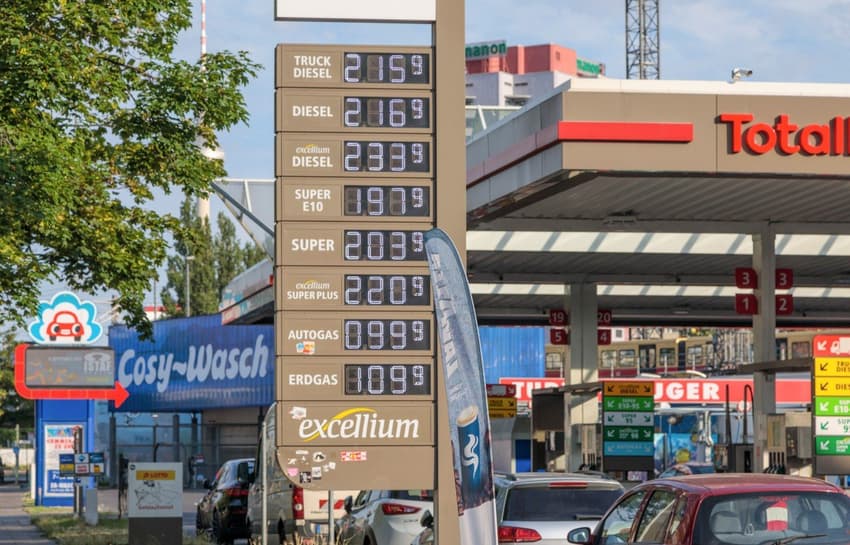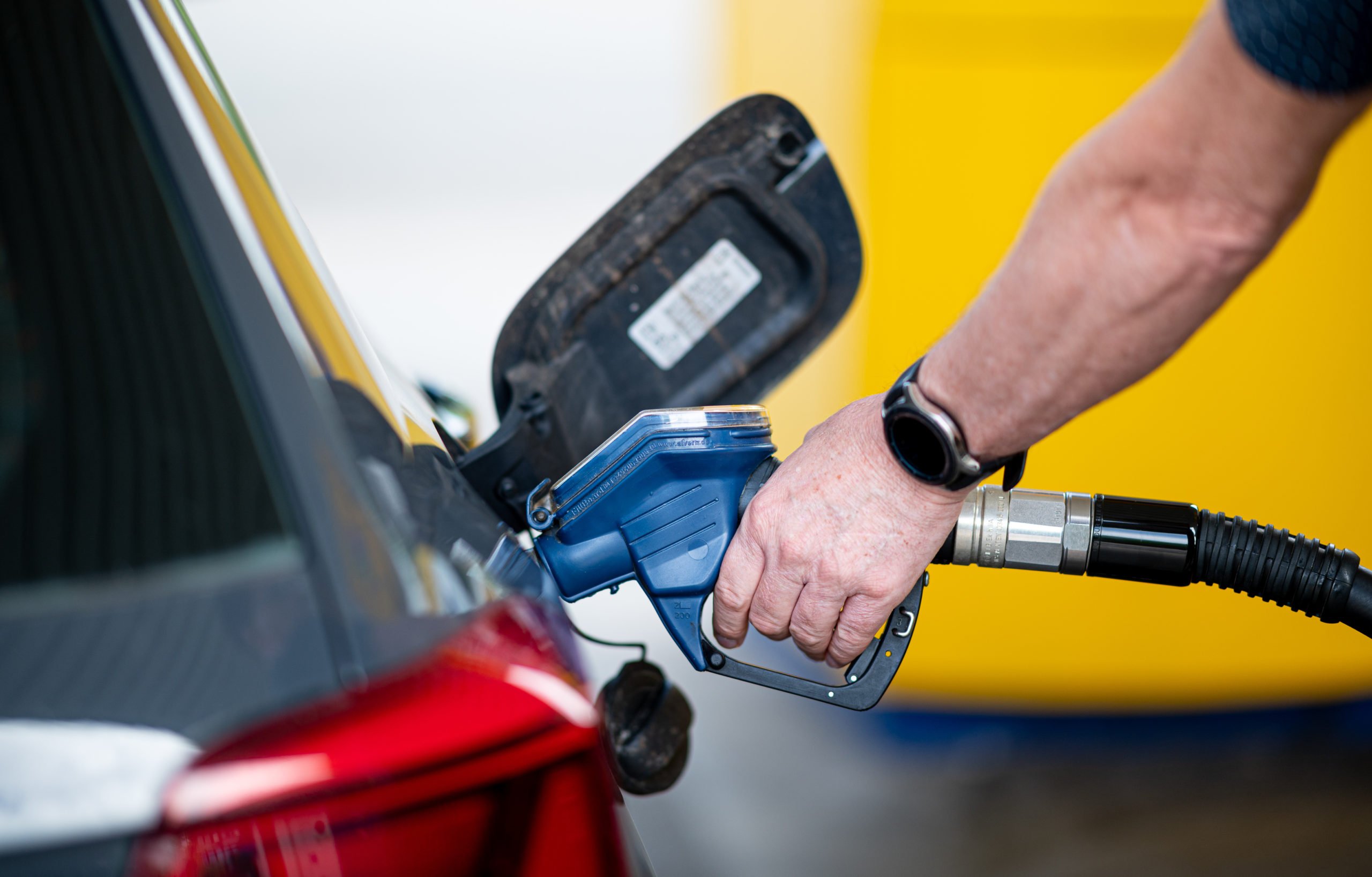EXPLAINED: Why fuel is so expensive in Germany right now

The price of petrol and diesel has risen steeply in Germany this August, with drivers paying significantly more per litre than they were a month ago. Here's what's behind the sudden change - and how car owners can find better deals.
How steeply have fuel prices risen lately?
Very steeply - especially when it comes to diesel. Over the past four weeks, motorists' association ADAC has reported an eye-watering 15 cent rise in the cost of diesel, putting it almost at the same price as petrol.
Currently, the average price of a litre of diesel in Germany is €1.785 - the highest price since February 2023. This makes it only around eight cents cheaper than the ordinarily expensive Super E10 petrol.
READ ALSO: Soaring food prices continue to drive inflation in Germany
The narrowing of the price between the two types of fuel is notable, especially since the taxes on diesel come in at 20 cents less than the taxes on petrol - and petrol has also been going up in price. Back in May, diesel cost around 23 cents less than a litre of petrol.
Meanwhile, motorists who fuel their car with petrol are currently an average of €1.868 for a litre of Super E10 - about seven cents more than they paid a month ago.
Why are petrol and diesel so expensive right now?
The price of fuel at the pump is heavily influenced by the price of crude oil on the international markets. This volatile asset can swerve between high and low prices depending on the time of year, the political landscape and the levels of supply and demand.
At the moment, key suppliers of crude oil appear to be seeing dwindling stocks. For example, the US reported an unusually strong decline in its national crude oil inventories in recent weeks. Other major producers of crude oil such as Russia and Saudi Arabia have been supplying less oil to partners for several months.
READ ALSO: Driving in Germany: Eight German road signs that confuse foreigners
The low supply comes at a time of year when demand is normally higher than usual: people tend to travel with their cars in August and end up filling up their tank more often. At the same time, there's currently a high demand for heating oil. This perfect storm has led to a situation where a barrel of crude oil currently costs a whopping $87 - the highest it's been all year.
According to ADAC, however, these economic factors don't tell the whole story. The motorists' association points out that the price level at petrol stations has been excessive for months, with the majority of petrol station operators hiking their prices.
Major operators such as Aral, Shell and Jet tend to take their lead from the competition when setting prices, so ADAC recommends that drivers always seek out the cheapest operator to help keep prices down.
Will fuel prices keep going up?
It certainly looks like it - at least according to ADAC's analysis.
With crude oil likely to become even scarcer as demand remains high, motorists will likely have to reckon with prices that remain at the current level or even go up throughout the year.
But even if crude oil prices relax somewhat on the international markets, drivers in Germany can still expect to feel the pinch at the petrol pump in the long run.

A man fills up his car at a petrol station in Hamburg. Photo: picture alliance/dpa | Daniel Reinhardt
That's because, from January 2024, the government wants to raise the CO2 tax on fossil fuels from €30 to €40 per tonne, rising to €50 per tonne in 2025.
The CO2 levies are to flow into the so-called Climate and Transformation Fund, a special fund set up by the Federal Government for multi-billion investments in climate protection and the transformation of the economy.
At the same time, the higher CO2 tax is intended to encourage petrol and diesel drivers to switch to more climate-friendly alternatives such as an electric car.
What can drivers do to avoid the highest prices?
Though motorists sadly have limited control over the price of fuel at the pump, there are a few things you can do to keep costs as low as possible.
One key strategy is to be careful about the time of day you choose to fill up your tank. Rather than going in the morning before work, it can be much more cost-effective to fill up in the evening.
According to an ADAC study, going to the petrol station between 6pm and 7pm or between 9pm and 10pm can save you as much as nine cents per litre compared to filling up in the busy 7am rush hour.
Another key tactic to avoid rip-off prices is to shop around for the cheapest deal at petrol stations. Many people aren't aware that prices can differ by as much as seven cents per litre, with motorway petrol stations among the most expensive.
Drivers can use fuel apps to view the current prices of many of the more than 14,000 petrol stations in Germany - and if they drive to the cheapest one, they promote competition on the fuel market and help to drive prices down.
READ ALSO: Driving in Germany: Why is car insurance getting more expensive?
Finally, drivers who want to save themselves some cash should pay attention to their own driving style.
People who drive at a steady pace and don't put their foot on the accelerator so often tend to use far less fuel than people who regularly put their pedal to the metal.
In fact, you can use up to 20 percent less petrol by adopting a relaxed and slower driving style, which will also save you money at the pump in the long-run.
Comments
See Also
How steeply have fuel prices risen lately?
Very steeply - especially when it comes to diesel. Over the past four weeks, motorists' association ADAC has reported an eye-watering 15 cent rise in the cost of diesel, putting it almost at the same price as petrol.
Currently, the average price of a litre of diesel in Germany is €1.785 - the highest price since February 2023. This makes it only around eight cents cheaper than the ordinarily expensive Super E10 petrol.
READ ALSO: Soaring food prices continue to drive inflation in Germany
The narrowing of the price between the two types of fuel is notable, especially since the taxes on diesel come in at 20 cents less than the taxes on petrol - and petrol has also been going up in price. Back in May, diesel cost around 23 cents less than a litre of petrol.
Meanwhile, motorists who fuel their car with petrol are currently an average of €1.868 for a litre of Super E10 - about seven cents more than they paid a month ago.
Why are petrol and diesel so expensive right now?
The price of fuel at the pump is heavily influenced by the price of crude oil on the international markets. This volatile asset can swerve between high and low prices depending on the time of year, the political landscape and the levels of supply and demand.
At the moment, key suppliers of crude oil appear to be seeing dwindling stocks. For example, the US reported an unusually strong decline in its national crude oil inventories in recent weeks. Other major producers of crude oil such as Russia and Saudi Arabia have been supplying less oil to partners for several months.
READ ALSO: Driving in Germany: Eight German road signs that confuse foreigners
The low supply comes at a time of year when demand is normally higher than usual: people tend to travel with their cars in August and end up filling up their tank more often. At the same time, there's currently a high demand for heating oil. This perfect storm has led to a situation where a barrel of crude oil currently costs a whopping $87 - the highest it's been all year.
According to ADAC, however, these economic factors don't tell the whole story. The motorists' association points out that the price level at petrol stations has been excessive for months, with the majority of petrol station operators hiking their prices.
Major operators such as Aral, Shell and Jet tend to take their lead from the competition when setting prices, so ADAC recommends that drivers always seek out the cheapest operator to help keep prices down.
Will fuel prices keep going up?
It certainly looks like it - at least according to ADAC's analysis.
With crude oil likely to become even scarcer as demand remains high, motorists will likely have to reckon with prices that remain at the current level or even go up throughout the year.
But even if crude oil prices relax somewhat on the international markets, drivers in Germany can still expect to feel the pinch at the petrol pump in the long run.

That's because, from January 2024, the government wants to raise the CO2 tax on fossil fuels from €30 to €40 per tonne, rising to €50 per tonne in 2025.
The CO2 levies are to flow into the so-called Climate and Transformation Fund, a special fund set up by the Federal Government for multi-billion investments in climate protection and the transformation of the economy.
At the same time, the higher CO2 tax is intended to encourage petrol and diesel drivers to switch to more climate-friendly alternatives such as an electric car.
What can drivers do to avoid the highest prices?
Though motorists sadly have limited control over the price of fuel at the pump, there are a few things you can do to keep costs as low as possible.
One key strategy is to be careful about the time of day you choose to fill up your tank. Rather than going in the morning before work, it can be much more cost-effective to fill up in the evening.
According to an ADAC study, going to the petrol station between 6pm and 7pm or between 9pm and 10pm can save you as much as nine cents per litre compared to filling up in the busy 7am rush hour.
Another key tactic to avoid rip-off prices is to shop around for the cheapest deal at petrol stations. Many people aren't aware that prices can differ by as much as seven cents per litre, with motorway petrol stations among the most expensive.
Drivers can use fuel apps to view the current prices of many of the more than 14,000 petrol stations in Germany - and if they drive to the cheapest one, they promote competition on the fuel market and help to drive prices down.
READ ALSO: Driving in Germany: Why is car insurance getting more expensive?
Finally, drivers who want to save themselves some cash should pay attention to their own driving style.
People who drive at a steady pace and don't put their foot on the accelerator so often tend to use far less fuel than people who regularly put their pedal to the metal.
In fact, you can use up to 20 percent less petrol by adopting a relaxed and slower driving style, which will also save you money at the pump in the long-run.
Join the conversation in our comments section below. Share your own views and experience and if you have a question or suggestion for our journalists then email us at [email protected].
Please keep comments civil, constructive and on topic – and make sure to read our terms of use before getting involved.
Please log in here to leave a comment.